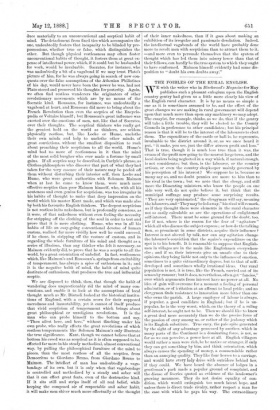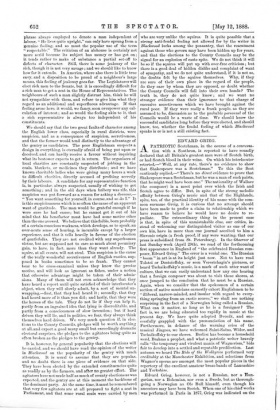THE FOIBLES OF THE RURAL ENGLISH.
WE wish the writer who in Blackwood's Magazine for May publishes such a pleasant eulogium upon the English country gentry had given us a little more clearly his view of the English rural character. It is by no means so simple a one as it is sometimes assumed to be, and the effect of the great changes we are making in rural government will depend upon that much more than upon any machinery we may adopt. The essayist, for example, thinks, as we do, that if the gentry will take a little trouble, they will be elected to the County Councils in preference to other candidates ; but his principal reason is that it will be to the interest of the labourers to elect them. The expenditure of the castle or hall is, he represents, invaluable to the district around it, or, as we once heard it put, "it make, you see, just the differ atween profit and loss." That is true, though it is much less true than it was, the cream of the profit now going to the nearest large town, and the local dealers being neglected in a way which, if natural enough, is not considerate ; but then, is the labourer, or the country artisan, or even the country shopkeeper mainly governed by his perception of his interest ? We suppose he is, because so many say so, and no doubt pennies are more to him than to his rival in the town ; but we note that the clergy, and still more the Dissenting ministers, who know the people on one side very well, do not quite believe it, but think that the municipal suffrage may produce some surprising results. "They are very opinionated," the clergyman will say, meaning the labourers, and " They may be led away," his rival will remark, as if they thought there were elements in the rural character not so easily calculable as are the operations of enlightened self-interest. There must be some ground for the doubt, too, for if not, where is the reason for the fear of " agitators " which all who discuss the subject express ; or how do the talking men, so prominent in some districts, acquire their influence ? Interest is not altered by talk, nor can any agitation change the labourer's conviction that the squire's expenditure on the spot is to his benefit. It is reasonable to suppose that English- men in villages are in the main like Englishmen everywhere else ; and if so, their interests give an unsafe clue to their opinions, they being liable not only to the influence of emotion, sometimes to a quite eitraordinary degree, but to that of self- developed and sometimes wholly irrational ideas. Our rural population is not, it is true, like the French, carried out of its senses by rumour; but it does, nevertheless, often get "fancies," over which arguments from interest have no power at all. No idea of gain will overcome for a moment a feeling of personal admiration, or of irritation at an affront to local pride ; and no clergyman finds resistance to innovation more bitter than one who owns the parish. A large employer of labour is always, if popular, a good candidate in England; but if he is un- popular, he is the very worst, which, on the theory of a ruling self-interest, he ought not to be. Then we should like to know a great deal more accurately than we do the precise force of the passion of envy among us, or rather of the jealousy which is its English substitute. True envy, the pale spite generated by the sight of any advantage possessed by another, which in many parts of the Continent is a dominating force, is not, so far as we can perceive, a power here at all. English villagers would rather a man were rich, be he native or stranger, if only they can get something by him, and think ostentation, which always causes the spending of money, a commendable rather than an annoying quality. They like four horses to a carriage, and would have every lady drive with outriders behind her, if they could. We have heard the absence of lodges in a gentleman's park made a popular ground of complaint, and the disuse of liveries quoted as evidence of the landowner's growing meanness. They do not desire equality of con- dition, which would extinguish too much latent hope, and unless there is direct trade rivalry, rather respect a man for the ease with which he pays his way. The extraordinary phrase always employed to denote a man independent of labour, "He lives quite upright," can only have sprung from a genuine feeling, and so must the popular use of the term "respectable." The criticism of an alehouse is certainly not more acrid because its subject has money or has got on ; it tends rather to make of substance a partial set-off to defects of character. Still, there is some jealousy of the rich, though it is not very savage ; and we should like to know how far it extends. hi America, where also there is little true envy, and a disposition to be proud of a neighbour's large means, this feeling of jealousy goes far. The Legislatures will elect rich men to the Senate, but it is exceedingly difficult for
a rich man to get a seat in the House of Representatives. The neighbours of such a man slightly distrust him, think he will not sympathise with them, and refuse to give him what they regard as an additional and superfluous advantage. If that feeling arose here, it would, we fancy, soon overpower any cal- culation of interest ; and so would the feeling akin to it, that a rich representative is always too independent of his constituents.
We should say that the two great faults of character among the English lower class, especially in rural districts, were suspicion, and as a consequence of suspicion, secretiveness, and that the former would tend distinctly to the advantage of the gentry as candidates. The poor Englishman suspects a design in everything, is eternally afraid of being put upon or deceived, and can hardly receive a favour without inquiring what its bestower expects to get in return. The organisers of local charities are constantly suspected of jobbing in the coals, blankets, or medicines they distribute ; and we have known charitable ladies who were giving many hours a week to difficult charities, directly accused of profiting secretly by their labours. A candidate for any representative function is, in particular, always suspected, usually of wishing to get something ; and in the old days when bribery was rife, this suspicion was put forward as a reason for asking a douceur,— " Yon want something for yourself, in course, and so do I." It is this suspiciousness which is so often the cause of an apparent want of gratitude. The man would be grateful enough if he were sure he had cause ; but he cannot get it out of his mind that his benefactor must have had some motive other than the one avowed. We believe that this foible, born probably of a certain conscious weakness, which develops, so to speak, an over-acute sense of hearing, is incurable except by a larger experience, and that it tells heavily in favour of the election of gentlefolks. They are not credited with any superhuman virtue, but are supposed not to care so much about pecuniary gain, to have, in fact, more than they want already. The squire, at all events, will not steal. This suspicion is the cause of the really wonderful secretiveness of English rustics, sup- posed in books sometimes to be so frank. They cannot bear to be cross-examined unless they know the precise motive, and will look as ignorant as fishes, under a notion that otherwise advantage might be taken of their admis- sions. Many of them will not even acknowledge that they have heard a report until quite satisfied of their interlocutor's object, when they will slowly admit, by a sort of mental un- wrapping.—first, that they had heard it ; secondly, that they had heard more of it than you did ; and lastly, that they were the heroes of the tale. They do not lie if they can help it, partly from an ingrained idea that lying is discreditable, and partly from a consciousness of slow invention ; but if hard driven they will lie, and in politics, we fear, they always think themselves hard driven. We very much question if, in elec- tions to the County Councils, pledges will be worth anything at all, and expect a good many small but exceedingly dramatic electoral surprises, the pledges to the agitators being quite as often broken as the pledges to the gentry.
It is, however, by general popularity that the elections will be carried, and we should have read the opinion of the writer in Blackwood on the popularity of the gentry with much attention. It is usual to assume that they are popular, and no doubt there is one piece of evidence on that side. They have been elected by the extended constituencies quite as readily as by the farmers, and after no greater effort. The agitators have not made half as much of county elections as was expected, and the gentry are at this moment the backbone of the dominant party. At the same time, it must be remembered that very few agitators are at all prepared to fight a seat in Parliament, and that some rural seats were carried by men who are very unlike the squires. It is quite possible that .a strong anti-feudal feeling not allowed for by the writer in Blackwood lurks among the peasantry, that the resentment against those who govern may have been hidden up for years, and that the elections to the County Councils may be the signal for an explosion of caste spite. We do not think it will be so if the squires will put up with over-free criticism; but there is a good deal of hidden dislike and complaint of want of sympathy, and we do not quite understand, if it is not so, the doubts felt by the squires themselves. Why, if they are sure of their own place in the regard of the people, do they care by whom they are opposed, or doubt whether the County Councils will fall into their own hands P The truth is, they do not quite know ; and we want no stronger evidence than their ignorance to that charge of excessive secretiveness which we have brought against the rural poor. If they were really a frank people, as they are assumed to be, discussion as to the probable personnel of the Councils would be a waste of time. We should know the successful candidates long before they were elected, and should know, too, whether the feudal feeling of which Blackwood speaks is or is not a still existing fact.



































 Previous page
Previous page